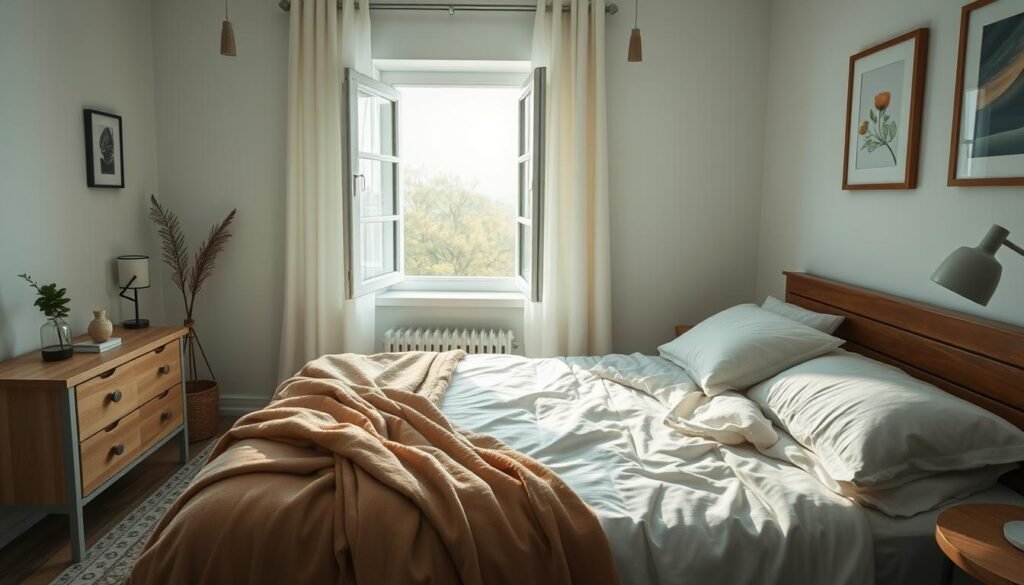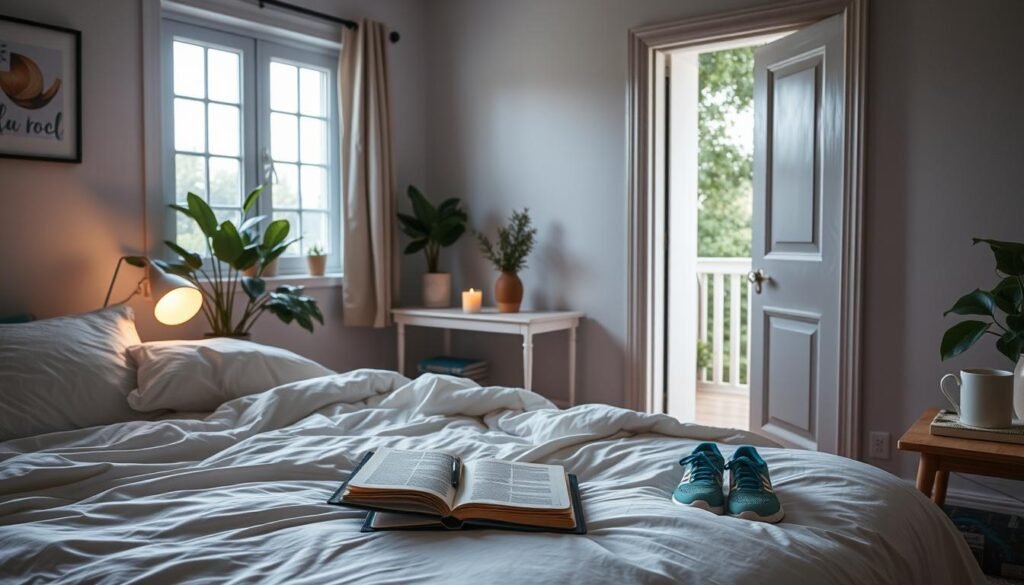Have you ever thought about how changing your sleep routine could make you mentally healthier? The connection between good sleep habits and depression is about more than just sleeping better. It opens a way to a healthier mind. Studies show that one-third of people have trouble sleeping. This can lead to big problems like more anxiety and depression.
Getting enough good sleep is key for a healthy mind. It can make a big difference in how well you sleep, helping you handle depression better. By sleeping well, you fight off insomnia and can feel less depressed and anxious. This is what research has shown. Knowing how sleep affects your mental health is very important.
This article talks about ways to sleep better and improve your mental health. Want to know more about how sleep affects your mood? Read this detailed study. It shows how good sleep leads to a healthier mind.
Key Takeaways
- Improving sleep hygiene can significantly enhance mental health.
- Connection exists between insomnia and increased risk of depression.
- Creating a consistent sleep schedule contributes to better sleep quality.
- Effective sleep practices directly impact anxiety and overall mental well-being.
- Comprehensive sleep strategies are essential in the treatment of depression.
The Connection Between Depression and Sleep
The link between depression and sleep is complex. Many people with depression struggle with sleep. Studies show that about 75% of them have trouble falling and staying asleep. This shows the deep sleep connection between these two issues.
40% of insomnia sufferers also have depression. Sleep disorders like sleep apnea make it worse. In fact, 20% of depressed individuals have sleep apnea. Also, their sleep can swing between too little and too much during depressive times. This shows the two-way link between sleep and depression.
Sleep problems can lead to depression and make it come back in those who recovered. People with insomnia have a much higher risk of getting depression. Seasonal changes, like winter, can also disrupt sleep and mood.
It’s important to notice how depression affects sleep. For example, men might get irritable and women may feel sad or guilty. Teens could get irritable and do worse in school. Recognizing these signs is crucial for dealing with depression and sleep problems.
| Sleep Disorder | Prevalence in Depression | Association with Insomnia |
|---|---|---|
| Obstructive Sleep Apnea | 20% | Exacerbates insomnia symptoms |
| Hypersomnia | 15% | Can alternate with insomnia |
| Insomnia | 75% | Commonly found in depression |
| Restless Legs Syndrome | 4.54% | Increased depressive symptoms |
Finally, we can’t ignore the deep link between depression and sleep. Understanding this helps improve mental health care. It shows why treating sleep issues in depressed patients is essential.
Understanding Sleep Disorders
Sleep disorders include conditions that greatly affect mental health. Common ones are insomnia, hypersomnia, and obstructive sleep apnea. These disorders impact both how much and how well someone sleeps. They can also make mental health issues like depression worse.
Common Sleep Disorders Related to Depression
About one-third of adults deal with insomnia, and 4 to 22% actually have insomnia disorder. People with insomnia find day-to-day life hard. This can add to mental health struggles. Nearly 75% of those with depression also have insomnia symptoms. This shows how connected the two issues are. Hypersomnia, or sleeping too much, also affects mental health deeply.
How Sleep Disorders Impact Mental Health
Obstructive sleep apnea is linked to depression and anxiety. It stops air flow during sleep, leading to poor sleep and less mental clarity. Over 50 million Americans suffer from chronic sleep issues. These contribute to anxiety and depression. Problems with serotonin and natural sleep cycles can make someone more prone to these mental health issues.
To better understand sleep and its role in mental health, check out resources like this link.
Exploring the Symptoms of Depression
The symptoms of depression appear in different ways, starting with how a person feels. Many feel sad or don’t have the energy, which makes daily activities hard. Getting irritable and having a hard time focusing are also common and make even easy tasks challenging.
Trouble sleeping is often an early sign of depression. Even small sleep problems can lead to mood changes. More serious issues, like insomnia, increase the risk of deepening depression. It becomes harder to fight depression when sleep is a struggle. So, it’s vital to pay attention to sleep issues early on.
Making good sleep habits is key for better rest. Doing physical activities during the day helps you sleep well at night. Avoiding big meals before bed and reducing caffeine and alcohol intake are smart choices for better sleep.
| Factors Impacting Sleep and Depression | Impact on Symptoms of Depression |
|---|---|
| Poor Sleep Quality | Increases fatigue, irritability, and concentration issues |
| Insomnia | Heightens risk of depression development |
| Lack of Regular Sleep Schedule | Contributes to persistent sleep issues |
| Physical Inactivity | Decreases overall well-being and sleep quality |
| Poor Dietary Choices | Negatively affects mood and energy levels |
| Excessive Napping | Can disrupt nighttime sleep patterns |
Understanding the emotional changes that come with depression means looking at mental health broadly. Making your bedroom quiet, dark, and free of electronics can help you fall asleep. These steps build a link between good sleep habits and better mental health.
Improving Sleep Hygiene with Depression
Getting better sleep is key in managing depression. Good sleep habits can really change how we feel emotionally and mentally. By making small, mindful changes to our bedtime routines, we can boost our overall well-being.
Recognizing the Importance of Sleep Hygiene
Good sleep habits help us get better sleep. Sticking to a schedule makes mornings easier and keeps our energy up. Going to bed at the same time every night helps our body’s clock, fighting the tiredness that comes with depression.
Bad sleep habits lead to feeling sleepy during the day, waking up often, and trouble falling asleep. Not sleeping enough can make depression worse by messing with our ability to think clearly and make decisions. It can also make us feel irritable by raising stress hormones.
Establishing a Sleeptime Routine
Having a peaceful bedtime routine is crucial. Activities like reading, meditating, or a warm bath tell our body it’s time to rest. It’s important to try and sleep and wake up at the same time every day to keep our body’s clock on track.
A good sleep setting makes a big difference too. A cool, dark, and quiet bedroom helps us relax. Cutting down screen time before bed helps with sleep. Regularly exercising, like walking for 30 minutes, can lift our spirits and help us sleep better. Doing relaxing exercises before bed also calms our mind, making it easier to fall asleep.

Strategies for Better Sleep Quality
To get better sleep, it’s key to create a setup that’s comfy and relaxing. For folks dealing with depression, small changes can make a big difference in their wellbeing. It’s about making your sleeping area nice and trying relaxation methods before bed.
Creating a Comfortable Sleep Environment
Having a cozy place to sleep is crucial for good sleep. Important things to remember include:
- Maintain a cool temperature in the bedroom, ideally between 60 and 67°F (15.6 and 19.4°C).
- Ensure that the room is dark to promote melatonin production, which is vital for sleep.
- Invest in comfortable bedding to improve the overall sleeping experience.
- Limit noise disruptions to foster a peaceful atmosphere conducive to rest.
- Consider using a weighted blanket to offer a sense of security and potentially enhance relaxation prior to sleep.
Incorporating Relaxation Techniques
Using relaxation techniques can really help with getting better sleep. These methods reduce stress and get your mind ready for sleep. Here are some good techniques:
- Mindfulness meditation: Doing it daily can cut down on stress and help you focus.
- Deep breathing exercises: This can slow your heart rate and help you relax.
- Progressive muscle relaxation: Relaxing different muscle groups to release stress can make you feel peaceful.
- Doing 30 minutes of aerobic exercise most days can improve sleep by boosting endorphins.
- Avoid caffeine in the late afternoon or evening as it can keep you awake longer than you’d like.
The Role of Lifestyle Changes
Making positive changes in your life can greatly improve your mental health. This is especially true for those with depression. Eating well and exercising regularly can help you sleep better and feel happier.
Dietary Considerations for Improved Sleep
Some foods help you sleep better and boost your mood. Eating foods high in melatonin and magnesium can improve your sleep. Nuts, seeds, fruits, and whole grains are very good for you.
Following a Mediterranean diet can also make you happier and less depressed. Studies show people eating this way feel better mentally.
Exercise as a Mood Booster
Regular exercise acts like a natural antidepressant. Walking or jogging for 30 minutes on most days can reduce depression symptoms. It makes you feel more cheerful and helps you sleep better.
A study found that increasing weekly walking time can greatly improve sleep and mood. So, moving more is key to feeling better.

Lifestyle changes are very important for mental health. It helps to get support from loved ones or professionals when making these changes. Eating well and staying active can really transform how you feel mentally. You can learn more about how pharmacists help with lifestyle changes here.
Cognitive Behavioral Therapy for Insomnia
Cognitive Behavioral Therapy for Insomnia (CBT-I) helps people with sleep issues, especially if they’re feeling down. It works by changing thoughts about sleep and teaching better sleep habits. Most folks see their sleep get better by 70% to 80%.
CBT-I treatment is usually 6 to 8 sessions. Sometimes, 2 to 3 sessions are enough for a good change. People learn different ways to relax, like:
- Breathing exercises
- Progressive muscle relaxation
- Autogenic training
- Biofeedback
- Hypnosis
- Meditation
CBT-I uses methods like sleep restriction and stimulus control. Sleep restriction means you spend less time in bed to feel more sleepy and less tired during the day. These steps help create a steady sleep schedule.
CBT-I aims to make the bedroom a place just for sleep. By doing this, it breaks the link between being in bed and not being able to sleep.
Studies show CBT-I might be better than pills for those with certain kinds of insomnia, like during pregnancy or with PTSD. For long-lasting sleep problems, mixing CBT-I with meds can help, especially if the meds are reduced slowly.
This therapy treats insomnia by looking at the whole picture and focusing on better sleep habits. It tackles the thinking and behavior patterns that stop good sleep. This improves sleep and helps with other mental health issues too.
Medication and Treatment Options
Dealing with depression and sleep issues needs a well-thought-out plan. This includes picking the right meds and treatments. Many folks with depression also find it hard to sleep well. They might have insomnia or other sleep problems. Knowing how sleep and mood affect each other helps in finding the best treatment.
Common Medications for Depression and Sleep Disorders
Meds are key in treating both depression and sleeping problems. There are many antidepressants out there. For example, SSRIs, SNRIs, and tricyclic antidepressants. Drugs like doxepin and mirtazapine are especially good for treating insomnia because they help you relax.
There are also different types of meds for sleep issues. These include benzodiazepine receptor agonists and melatonin receptor agonists. These are usually for short-term use. They can cause dependence and other issues. It’s important to work closely with your doctor to watch for side effects and make changes if needed.
The Importance of Personalized Treatment Plans
Creating a plan that’s just for you is crucial when tackling depression and sleep issues. Since everyone’s different, a one-size-fits-all approach doesn’t work well. Your plan might combine meds with therapy, like cognitive behavioral therapy (CBT). CBT is quite effective for treating insomnia and what causes it.
Mixing meds and therapy often improves sleep quality and mood. Keeping a sleep diary helps you and your doctor figure out the best way to handle your sleep problems. For more information on how sleep disorders and depression are connected, you can visit this resource.

| Type of Medication | Purpose | Examples |
|---|---|---|
| SSRIs | Treat depression | Fluoxetine, Sertraline |
| SNRIs | Treat depression | Venlafaxine, Duloxetine |
| Tricyclic Antidepressants | Help with insomnia | Doxepin, Amitriptyline |
| Melatonin Receptor Agonists | Improve sleep quality | Ramelteon |
| Benzodiazepine Receptor Agonists | Short-term sleep aid | Zolpidem, Eszopiclone |
The Importance of Circadian Rhythms
Circadian rhythms are key in setting our sleep patterns. They affect our mental health deeply. These cycles decide when we feel awake and when we’re sleepy. This happens over a 24-hour period. We sleep for about a third of our life. So, it’s crucial to keep these rhythms in check for good health.
When our circadian rhythms are off, we might face health issues. Working at night or being in too much artificial light hurts our sleep. This can lead to serious problems like diabetes and heart diseases. Studies show that people with night jobs have more mental health issues. This links our sleep cycle directly with our mental wellness.
Keeping a regular sleep schedule is super important. For example, people with major depressive disorder (MDD) often have messed up sleep cycles. They go to bed late and might not move much during the day. This shows how sleep timing affects our mood. We need to remember the balance between sleep, activity, and our inner clock.
Deep sleep does a lot of good for our brain. It helps our immune system, grows new cells, and cleans the brain. If our circadian rhythm is off, these benefits don’t happen as they should. This can make depression worse and lead to sleeping problems.
When to Speak With Your Doctor
It’s important to know when to get help for sleep and depression. You might feel sad, lose interest in fun activities, or see changes in how much you eat and sleep. If these signs last for weeks, you should see a doctor.
If sleep problems don’t go away even after trying to sleep better, it’s time to talk to your doctor.
Signs to Seek Professional Help
Some signs show you should talk to a doctor. Not being able to sleep well can harm your health and make depression worse. If sleep issues are making it hard to do everyday things, that’s a clear signal for help.
Doctors can help by creating a plan that may include therapy and medication. This addresses the root issue effectively.
The Link Between Persistent Sleep Issues and Depression
There’s a strong connection between not sleeping well and feeling depressed. If you’re depressed, you’re more likely to have trouble sleeping. Your mood and sleep affect each other a lot.
Getting help improves sleep and mental health. This shows why it’s crucial to seek help early for a better recovery.